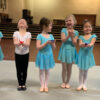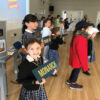by Marsha Dann
Lead Teacher, Play B C Preschool
We are big on books – I always say if there is one thing you do at home with your child it is read with them. It will have a significant impact on their language and comprehension when they get to school.
What is reading?
Reading is about making sense of the written word. It is linked to language and communication, but while these seem to develop organically, reading needs to be taught. It is hard to immerse a child in written language with the same intensity as is possible with spoken language.
Views on reading development are many and varied. Some think it is ‘bottom-up’, moving from specific to the general, print to meaning. Others think it is ‘top-down’, moving from general to the specific, meaning to print. Others still think it is a mixture of the two. Whatever the emphasis, there is some agreement that reading must involve both comprehending what print represents and what it means. You cannot really have read a word if you do not understand it.
Print is a code of sounds and written letters. Decoding involves breaking a word into its separate sounds and then putting them back together again. Eventually the code can be committed to memory. However, English is a tricky language to master, because our 26 letters make around 44 different sounds compared to other languages, such as Italian, where most letters only make one sound. Additionally, we have a vast number of irregular words. As a result it can take children two or three years longer to read in English than in other more transparent languages. In England, children have less positive attitudes to reading. A quarter start school without the necessary language, communication, and literacy skills to get off to a good start. One in five cannot read well by the time they leave primary school and our teenagers have poorer literacy levels than those of many other nations.
How can you make a difference?
Polls suggest as few as one in five parents read daily to their children and the majority of those who do, find it stressful. This means an awful lot of children are not being read to and a less than ideal experience for many who are. In my opinion it is never too soon to start. Try to squeeze in a bit of time for a book every day. You can involve siblings or grandparents too. It does not have to be bedtime. Any time that works for you is good. Turn the TV off so your little one can concentrate on your voice, because sound discrimination and good listening are important pre-reading skills. Curl up together and get lost in a book. Be animated and keep it fun. They will be getting plenty of opportunities to develop the listening and understanding skills they need to become successful readers and writers.
When choosing books, expose your child to a variety of stories, cultures and characters. It is good to see themselves reflected in the pages of a book but also to see others who might be different too. Books with rich language to describe emotions, actions and themes are great but they should be accessible and not too long, although some rhyming and repetitive books can engage children for longer than you might think.
Encourage your child to participate in story sharing and see themselves as readers. Even if it is just by pointing or making a one word comment. Wordless picture books can be excellent for this as they are open-ended and there are no rights or wrongs. For children with more language, ask what they can see and leave gaps for them to fill. Afterwards ask questions to check they have understood and see if they can draw links between what you have read and their own lives?
If you do not have access to books, there are online options and over COVID lockdowns, lots of authors have read their own stories. It is nice though to get your hands on an actual physical book. Although many of the libraries are closed, some are offering book packs for preschoolers. Tap into your child’s interests. If they do not enjoy books, try magazines, audio books or online interactive stories. Your child’s preschool may also be able to quarantine some books and lend them to you.
Children who are read to frequently get higher results in maths, vocabulary, and spelling tests than those who are not and reading enjoyment is said to be a more reliable indicator of educational success than the family’s financial or social status. Get them hooked on books and change their lives.
Teacher-led Play B C offers fun, yet challenging early education and prioritises relationships within preschool and also with the wider community. Interaction and enablement of free play is judged to be ‘excellent’ and practice has been further validated with an Early Years Quality Mark. More than just a place, at Play B C every day is a learning adventure. Contact admissions@playbc.co.uk to arrange a vist.










